What is it about human nature that demands that we pit people, things, franchises, companies, characters, what have you against each other? Why are we so insistent on only looking at antagonistic narratives where two foes battle it out for supremacy? What does this say about us?
I don't mean this as a criticism of Captain America: Civil War, by the way. I have no problem with watching Steve Rogers and Tony Stark try to punch the crap out of each other over ideological differences. No, my problem here is with the media for turning a movie about really complex issues of regulation and security and humanity into another blow in the manufactured battle between Marvel and its nearest competitor, DC Comics.
Sigh.
I mean, hell, they're even similar characters. Bruce Wayne and Tony Stark, the wealthy industrialist representatives of the free market, beating down on Clark Kent and Steve Rogers, the idealistic boy scouts from low income backgrounds who distrust capitalism and its governmental support systems. In a lot of ways, sure, these two movies are ripe for comparison. But, then again, they're really not.
While Batman v Superman was only the second film in a franchise just getting its legs under it, Captain America: Civil War is the umpteenth movie for the Marvel Cinematic Universe, a culmination of a conflict between characters that started way back in The Avengers. This beef has been a long time coming and is clearly and cohesively worked in the world of the story. Batman v Superman, unfortunately, can't benefit from this long history of films and character development, and so it has to go its own way. Which means that while it's satisfying and pretty true to say that Civil War is the movie that Batman v Superman was trying to make, it's also not even close to the whole story.
This is the whole story.
Captain America: Civil War is in a lot of ways a continuation both of Captain America: The Winter Soldier and Avengers: Age of Ultron. While these are two very different movies with very different agendas, Civil War does an admirable job of spinning them together and showing us the resultant kaleidoscope of characters and themes.
It's a good combination. For all of its flaws - this film really does suffer from an overabundance of superheroes, making each character's time on screen feel a little rushed - Captain America: Civil War is a very good movie about a very complicated issue. It balances the ideological views on both sides of the aisle without making the audience feel like one side is inherently worse than the other and it still tells a pretty damn good story even through a haze of bureaucratic legalese. That takes skill.
But more than just managing to tell a pretty decent story about differences in public policy, where Civil War really succeeds is in breaking your heart. I mean that nicely, by the way. Even with the limited screentime and constraints of a big Hollywood movie, the film does a fantastic job of getting you emotionally invested in their characters and their conflicts, meaning that when they fight you don't get bored partway through - you're on the edge of your seat because everyone in this fight is a little bit important to you and this kind of hurts inside.
Even the characters who are just introduced in this film, like the newest Spiderman (Tom Holland) and our hero of perpetual epicness Black Panther (Chadwick Boseman), are written to be emotionally sympathetic and engaging without feeling like they're crammed down our throats. Hell, this movie managed to make me slightly emotionally invested in Tony Stark, and I didn't think that was possible.*
Tony, representative of the twenty-first century and the new life that Steve has in the here and now with the Avengers and his new friends, is competing with Bucky, the life that Steve knew and misses and desperately wants back, the life before he was Captain America when he was just some kid from Brooklyn. The film, more than anything else, is a conflict between these two forces, Steve's past and his present, to determine his future.
And I loved every minute of it.
I feel comfortable assuming here that most of you have either seen Civil War or are going to soon, so we'll skip the plot summary here and just get right into some analysis. What worked, what didn't work, and how much I want to wrap Bucky Barnes up in a blanket and cuddle him forever. Good? Good. [SPOILERS from here on out.]
Running up to this movie, I was skeptical of how the film would manage to believably pull off the emotional weight of Tony and Steve's conflict. Not because I didn't think that these two characters were capable of disagreeing strongly - the opposite. In the trailer they showed a little piece of a scene where Steve, defending Bucky, tells Tony, "He's my friend." And Tony, betrayed, says back, "So was I." And this should be heartbreaking and wrenching and all that, but all I thought on seeing the trailer was, "Really? Since when?"
Because, let's face it, Steve Rogers and Tony Stark haven't exactly been buddying it up in the Marvel movies so far. In contrast to their epic bromance of the comics, Steve and Tony are not each other's closest friends on the Avengers. They're barely even friends. Steve's best friends in this modern day are clearly Natasha and Sam, and Tony's are Rhodey and Bruce. If we were looking at Steve's speed dial, Tony Stark would probably rank around #7. I mean, he's on there, but not very high.
For someone who doesn't particularly care for Tony Stark, I was happily surprised by how much I empathized with him in this film. The Russos did a fantastic job really bringing us into Tony's mindset and emotional state, even bringing us back around to show us how he's trying to deal with his earliest issues, like the death of his parents. By allowing Tony this complexity as the antagonist and showing how his reaction to the regulations is based in his own fear of himself, we aren't allowed to dismiss him. We have to take him seriously.
On the flip side, this movie really is all about Steve and it's so wonderful to see how they managed to tell a story where Steve Rogers is not uncomplicatedly good without turning him into an anti-hero. Instead, the movie examines where Steve Rogers stops and Captain America begins. It's really more about his legacy as Captain America, his identity as himself and how Steve Rogers has been subsumed by his costume until there is little of the actual man left. Civil War completes the arc of these three Captain America films, bringing us full circle in Steve's identity.
In other words, the Captain America movies have always been about the tension between being Steve Rogers and being Captain America. The first film is about a Steve Rogers who desperately wants to be more and better but learns quickly the awful cost of that choice - he loses Bucky and he loses himself. Winter Soldier, then, shows us a world where Steve Rogers is basically gone. All anyone knows or talks about is Captain America - but it's in this film where we see Steve starting to come back to himself. It's where Sam pulls him out and starts to remind him how to live as a person and not a symbol. And it's where Steve gets his glimpses of the only people left in the world who remember him as Steve and not as the Captain: Peggy and Bucky.
So according to this analysis, Civil War is where Steve decides to grab at his past and take back his identity as Steve Rogers. He's tried to be both, but he can't. He can't be Captain America and Steve Rogers at the same time. Civil War is his last attempt, and, tellingly, it's the movie where Peggy Carter dies and Steve almost loses Bucky too. When push comes to shove, Steve decides that he'd rather be one than the other. That's how we get a scene where Steve walks away from it all, from Tony, leaving behind a painted shield and following Bucky Barnes.
When I say that Civil War is a love triangle between Tony and Steve and Bucky, what I also mean is that it's a competition between Captain America and Steve Rogers. Tony represents Captain America - he's standing in for the duty to others and the civic responsibility that led Steve to put on the costume in the first place. There's even a jolt of a scene where Steve has to fight Peter Parker, a standup kid from Queens who wears red, white, and blue and believes in fighting to defend the little guy. Steve instantly likes him, but there's also a sorrow there. Steve is almost done fighting. He's tired. He wants to be himself again, and so he's going to follow Bucky.
Bucky, of course, represents the life of Steve Rogers, the last tie that Captain America has to the person he used to be. Sure, Bucky's memory is swiss cheese and shot all to hell, but with Peggy gone, he's also literally the only person left in the world who remembers who Steve used to be. He's the only person left who knew about Steve Rogers first and Captain America second. So when Steve chooses him, he's making a pretty big statement. Not that we ever thought that Steve might not choose Bucky. Let's be real. That was never happening.
This movie is a love story - there's no getting around that. In fact, the movie seems almost uncomfortably aware of how much they're telling a love story that spans decades and continents and brain-altering technology. I have no explanation for the horrendously awkward Steve/Sharon kiss besides the filmmakers' desperate attempt to make the movie slightly less gay. It didn't work. And, unfortunately, it pushes a generally badass female character into the zone of uncomfortably incestuous love interest, one of the only flat notes this movie hits.
In general though, aside from a discomfort with showing Bucky and Steve - two friends reuniting after seventy years of horror - actually hugging, Civil War does a good job with their relationship. We believe that Steve loves Bucky and vice versa, even when it's painful and Steve has to admit his best friend might be a terrorist or Bucky is asking to be put down before he can kill again. It's heart-wrenching and a little awful and exactly what I was hoping for.
Actually, this brings me to a sidenote: Stucky fandom, pat yourselves on the back. While watching this movie I was genuinely shocked by how accurately a lot of the fics had predicted Bucky's mental state and physical condition after escaping from Hydra. Seriously, you all nailed it, from his tiny apartment where he sleeps in a sleeping bag on the floor to his hoarding of pictures of Steve and his backpack of treasures to his fragile emotional state. I'm very impressed. Carry on.
Anyway, there's a lot that bears mentioning about this film, but if I try to cover it all in this one article we're going to be here until the next Marvel movie comes out. Just trust that we'll talk more about T'Challa and his fantastic character arc in another article, that we'll get to discussing Wanda Maximoff, that we'll take the time to really dig into the movie's representations of mental illness, and hell, we might even spend a few words on Zemo and how he's a brilliant villain. We'll talk about all of it, don't worry. But for now, all I really want to think about are the feels.
And by the feels, what I means it the emotional weight of a movie that allows itself to hang on the skills of its actors. Civil War could have been a pretty standard superhero plot, but it's not because the character development in this film is insane. Even characters who have to step aside here to make way for the larger plot still get moments that remind us of why we relate to them. Sam Wilson, for example, isn't nearly as large a figure in this film as he was in Winter Soldier, but he's not really diminished either. His relationship with Steve remains rock solid, giving him a continuity of character that's really interesting to watch. Especially his interactions with Bucky, which were flat out hilarious highlights of the movie.
Natasha as well gets less screentime than she had in Winter Soldier, or Age of Ultron for that matter, but she still stands as an imposing figure. Her relationship with Steve, inarguably the most developed of the original Avengers, is a throughline for the film that puts the conflict into a much smaller and more human frame. While Tony disagreeing with Steve can be placed as just ideological differences, Natasha disagreeing with Steve hits hard. They're really close, and it's painful to see them on opposing sides even as Natasha flies across the world to give Steve a hug. Literally.
Hell, I hope Marvel is paying attention here because their arguments on why Natasha shouldn't get her own film are getting flimsier by the second. She really steals the show here.
Okay. I could keep going all day, but I really shouldn't. The real upshot here is that Captain America: Civil War is really a better movie than it has any right to be, even if it's still not a perfect one. It has emotional heft, great action, and a core conflict that genuinely does leave you thinking long after you leave the theater. I mean, I'm totally Team Cap, but I appreciate the value of a good moral dilemma with the best of them.***
Reducing this movie down to a pissing contest between Marvel and DC and comparing it endlessly to Batman v Superman is to do both films a great disservice. This movie is its own thing. It's a story about Captain America and the fight for the future of Steve Rogers and it's a love story between two men who would do literally anything for each other. You don't have to say it's anything else to get people's attention, that's more than enough.
Even if I'm still a little sad that Marvel hasn't made Jewish Bucky Barnes canon yet.
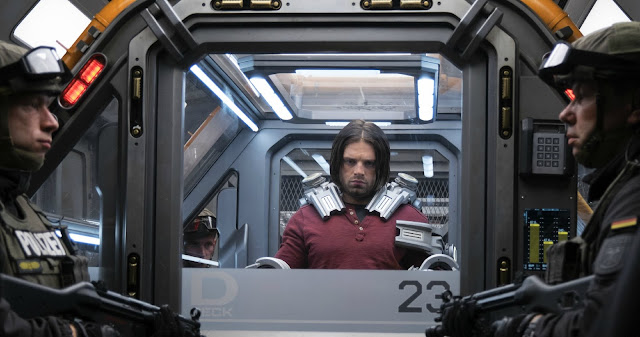 |
| #leavebuckyalone |
**I like to think that the writers chose to have Bucky hiding out in Romania so that Sebastian Stan, who is Romanian originally, got to actually speak his first language in a movie. Not sure if that's true, but I'm choosing to believe it because it's adorable.
***Probably more than most people actually. I was a philosophy major, after all.

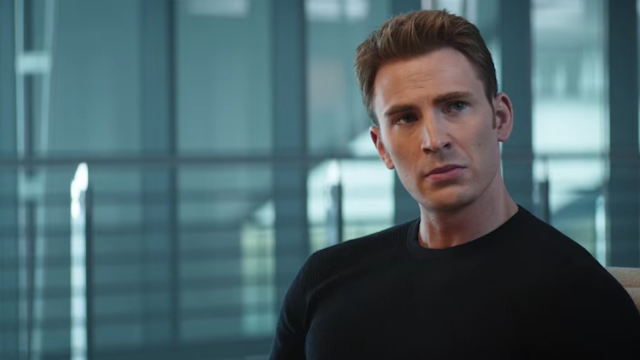
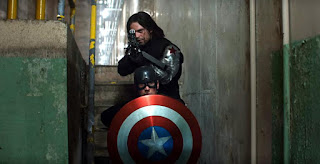
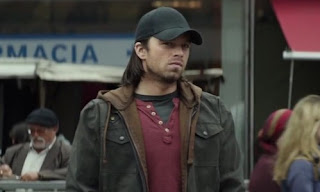
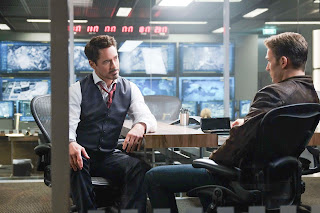


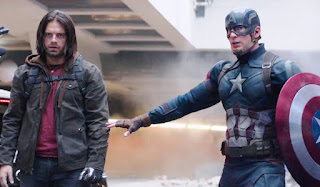
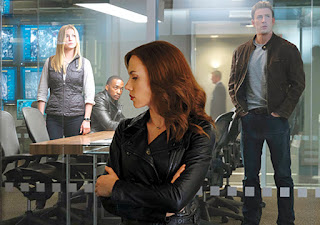
I loved Zemo as a villain. He talks about "bringing down an empire", but you can tell it's just a figleaf rationalization. He doesn't really care about any larger geopolitical project - he just wants the Avengers to suffer, wants them to tear themselves apart and hate each other.
ReplyDeleteCaptain America: Civil War is the umpteenth movie for the Marvel Cinematic Universe, a culmination of a conflict between characters that started way back in The Avengers.
ReplyDeleteFurther back, in a way. This isn't my observation, but: the bad guys in both Captain America films have been organisations backed by authority, which have chosen to use their power for oppression and destruction, while the bad guys in all three Iron Man films have been individual jerkfaces (ok, with minions in some cases) running amok. Even Tony himself fits into that mould in Iron Man 2, with the serving colonel Rhodey being the one to rein him in. Meanwhile - and this bit is my observation, I modestly add :) - Tony's "combat stalwart" has been the aforementioned Rhodey, while Steve's have been Peggy and the Howling Commandos, who all left their respective armies to form an ad hoc group of their own, followed by the also-retired Sam (no wonder the Avengers feel like home).
Which all serves to make it natural that the individualistic and iconoclastic Tony would still see the potential for good in the Accords, while the idealistic Steve would see the potential ill.
But the real core of the story is the functional love triangle between Tony Stark, Steve Rogers, and Bucky Barnes. Not in a romantic sense, but in the sense that intentionally or not both Tony Stark and Bucky Barnes are competing for Steve's heart.
Wow, that's a great point. I've seen a number of people question whether this should be seen more as a third Avengers film than a third Captain America film, but I think you've just made the clinching argument for why it's the latter.
Sure, Bucky's memory is swiss cheese and shot all to hell, but with Peggy gone, he's also literally the only person left in the world who remembers who Steve used to be.
At the same time, ironically, Steve is link to *Tony's* past. Whatever Tony's issues with his father, he regrets them - or at least regrets not having resolved them before Howard's death, as we see in the presentation. Steve is one of the last people left who knew Howard. Admiration and respect for Steve is something Tony gets to have in common with Howard - until he learned that Steve kept quiet about the truth of Howard and Maria's murders, and is now helping their killer go free - hence his last bitter comment about Steve not deserving the shield Howard made.
And Steve doesn't just set it down, he tosses it aside like garbage.
No, my problem here is with the media for turning a movie about really complex issues of regulation and security and humanity into another blow in the manufactured battle between Marvel and its nearest competitor, DC Comics.
ReplyDeleteMm, I've succumbed to that temptation myself. (Though only as regards those two films specifically. In general, why would I want the DC films to be more like the Marvel films; I already have the Marvel films for that, so I'm glad DC is going for a very different tone). But anyway.
Just trust that we'll talk more about T'Challa and his fantastic character arc in another article, that we'll get to discussing Wanda Maximoff, that we'll take the time to really dig into the movie's representations of mental illness, and hell, we might even spend a few words on Zemo and how he's a brilliant villain. We'll talk about all of it, don't worry. But for now, all I really want to think about are the feels.
Heh, because I have a lot to say about them. :)
On the subject of feels, I like that the "you move" speech was given to Peggy rather than Steve. Because to be honest, when Steve said it, it sounded self-righteous rather than righteous (and when the whole world is telling you you're wrong, it's usually a pretty good idea to at least hear the world out). But Peggy has has to tell the world to move more than Steve ever has or will, and on matters where it unquestionably *was* the world that needed to move.
Hell, I hope Marvel is paying attention here because their arguments on why Natasha shouldn't get her own film are getting flimsier by the second.
Yeah. While T'Challa essentially has the third protagonist arc if you frame it as an Avengers film with Bucky's fate and Zemo's plan as the main story, Natasha has the third one if you frame it as a Captain America film with Steve's identity and links to the past as the main story. She is one of Steve's anchors to the present, and one of the few people (more than Steve himself, really) who could understand the hell forced into Bucky's mind; to have her turn against him hurts, and to have her then help them both is a huge relief.
But it's also left Natasha alone, cut off from either side. She's lost all the anchors to her present - and unlike Steve, Tony, or even Bucky, she has no past worth a damn to hold on to. She must be at one of her lowest psychological ebbs ever, but at the same time in the perfect element for her skill set. What a bloody good time it would have been to give her a film.
In a recent interview, Team Marvel did say they wanted to do one, but were fuzzy as to when. Which probably means after Infinity War, meaning the great potential of her current status will likely have changed again, because I assume there will be reconciliations happening then. Though Inhumans is apparently off the schedule for now; whether that opens a slot, or they decided it was one film too many, I don't know.
You are one of the first reviews to make me question my previous opinion of this as the movie that made me lose respect for Steve Rogers/Captain America. I still don't think that a principled stand opposed to regulation by a white dude is ever principle that I can get behind. And this movie got Steve/Cap into that role. But you are not wrong about that being a reasonable response to TWS.
ReplyDeleteThis comment has been removed by the author.
DeleteHe was. And from the first movie, set in WWII I would agree. But pretending things haven't changed for him is also a bit much. Okay, it's new privilege, but it's still there.
Delete
ReplyDeletekolkata independent escorts
kolkata independent escort
independent escort in kolkata
independent escort kolkata
escort kolkata
escorts kolkata
escort in kolkata
escorts in kolkata
hot call girls in kolkata
kolkata best escort
kolkata best escorts
hi profile escort girls in kolkata
ESCORTS IN KOLKATA
ReplyDeleteCOLLEGE GIRL HOT
ESCORT SERVICE KOLKATA
KOLKATA VIP ESCORTS
KOLKATA HIGH PROFILE ESCORTS
KOLKATA COLLEGE ESCORTS
KOLKATA INDEPENDENT MODEL ESCORTS
KOLKATA CALL GIRLS ESCORTS
KOLKATA CHEEP ESCORTS
KOLKATA CALL GIRLS NUMBER ESCORTS
KOLKATA HIGH PROFILE ESCORTS
KOLKATA AIRHOSTESS ESCORTS
KOLKATA PARK HOTEL ESCORTS
KOLKATA PARK HOTEL ESCORT
KOLKATA FIVE STAR ESCORT SERVICE
KOLKATA HOUSEWIFE ESCORT SERVICE
KOLKATA BOUDHI ESCORTS
INDEPENDNET ESCORT IN KOLKATA
KOLKATA ESCORT AGENCY
RUSSIAN ESCORT
RUSSIAN ESCORTS
RUSSIAN CALL GIRL
RUSSIAN CALL GIRLS
HOUSEWIFE ESCORT
HOUSEWIFE ESCORTS
HOUSEWIFE CALL GIRLS
HOUSEWIFE CALL GIRL
MODEL ESCORT
MODEL ESCORTS
COLLEGE CALL GIRL
COLLEGE CALL GIRLS
INDEPENDENT ESCORT SERVICE
INDEPENDENT ESCORTS SERVICE
INDEPENDENT ESCORTS SERVICES
INDEPENDENT CALL GIRL
INDEPENDENT CALL GIRLS